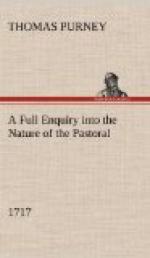If I might advise you, Cubbin, I would have you always write Pastorals in either such a Language as this, entirely uniform and of a piece, or else to write in a strong polite Language. Never write any single thing in a low and mean Language. Polite Language is only faulty with respect to it’s being in Pastoral; but low Language is in it’s own Nature faulty. The first is only unnatural; the latter is stupid and dull. Therefore unless you resolve to go quite thro’, never weaken or enervate your Pastoral Language at all. Unless you resolve to add Simplicity and Softness, to supply the place of Strength, never rob it of it’s Strength. It had better have strength and Sprightliness and Politeness than Nothing.
The best Way is that which Sir Philip Sidney has taken, to suppose your Swains to live in the Golden-Age, and to be above the ordinary Degree of Shepherds, for Kings Sons and Daughters, were then of that Employ. And upon this Supposition to make ’em talk in a polite, delightful and refined Dialect. By this Means you will disable the Criticks at once.
But perhaps some may expect that I should vindicate the Use of Old-Words, on my own Account. But for that Reason I am the more careless in touching the Subject; because I would leave the World to a free and unbias’d Judgment of what I have done. Nor is this an Age, indeed, to begin to vindicate Old-Words in. The Method has been approv’d of in all Ages even in Epick Poetry and Tragedy, and should we go now to defend it in Pastoral? A Friend indeed of SPENCER’s wrote a Vindication of his Old-Words, but had SPENCER been living be would doubtless have been ashamed of it’s appearing in the World. ’Tis the Opinion of the best Judges that the Old-Words used by Mr. Row, even In the Tragedy of JANE SHORE are a great Beauty to that Piece. And those who have objected against SALLUST for affecting Old-Words, have made nothing out. Tho’ History is to deliver plainly Matters of Fact, and not to flourish, and beautify it’s self with foreign Ornaments, as Poetry is. There are not so many disapprove of SALLUST’s Old-Words, as commend him for adding a Majesty and Solemness to his Writings thereby.
I might add (were there occasion for vindicating Old-Words) that we have render’d our English Language unexpressive and bare of Words, by throwing out several useful Old-Words; as Freundina a She-Friend; Theowin a She-Servant, &c. But as no one has shewn Old-Words to be faulty, for so many hundred Years, ’twould be folly to trouble the Reader with a Vindication of ’em, at this Day. The only Question is, whether an Author has chose the Softest and Finest; or has shown by his Choice the weakness of his Judgment.
SECT. 3.
Of Compound Words.




